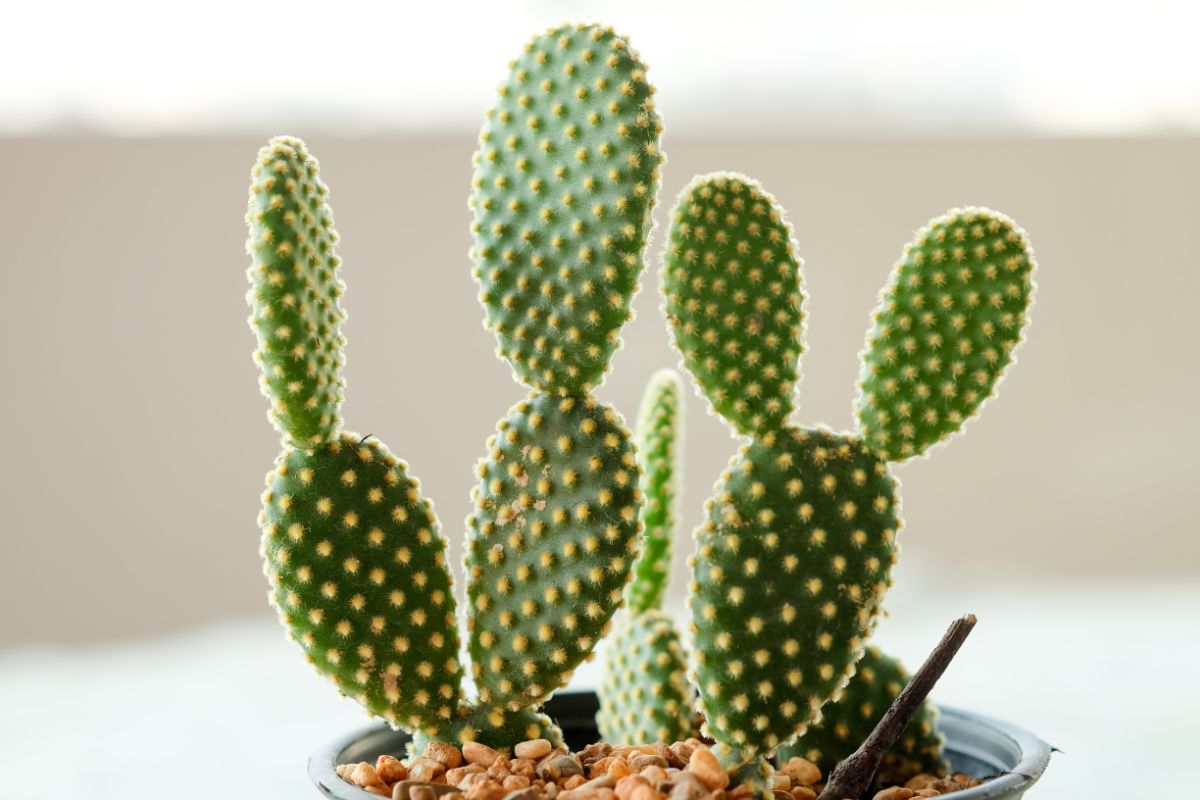Cactus are not toxic if consumed, but their sharp spines make them hazardous to pets all the same. Take particular care with members of the Opuntia (Prickly Pear) genus. They don’t always have long spines, but they do have tiny, barbed glochids.
Are Succulents Poisonous to Dogs?
Succulents have gained immense popularity because of their easy-care characteristics. However, some of them are toxic to dogs. Therefore, you must understand which houseplants are safe for your furry friends to be around and which ones are poisonous.
-
Succulents Safe for Dogs
4. Blue Echeveria (Echeveria Secunda)
6. Chinese Money Plant (Pilea Peperomioides)
7. Prickly Pear (Opuntia Stricta)
-
Succulents Toxic to Dogs
1. Kalanchoe: Known for their vibrant blooms, kalanchoe plants make ideal indoor plants. The Mother of Millions, Panda Plant, Devil’s Backbone, and Chandelier Plants are the most well-known varieties of this succulent. Dogs that eat kalanchoe will exhibit symptoms such as vomiting, diarrhea, irregular heartbeats, and severe weakness because it is poisonous to them. It is advisable to exercise caution and set it somewhere your dog cannot access. If ingested, take medical help to avoid any loss.
2. The Jade Plant, or Crassula Ovata, is a tree-like plant that is simple to grow. These houseplants have several species. Dogs that eat toxic plants like jade or rubber will throw up or have a slow heartbeat.
3. The String of Pearls, also referred to as the String of Beads, is a popular succulent among plant enthusiasts, Senecio Rowleyanus. However, String of Pearls is toxic to your furry friends. When ingested, dogs experience gastrointestinal upset, vomiting, lethargy, and diarrhea.
4. Aloe Vera: These plants are well-known for their therapeutic and curative qualities. Because aloe plants contain a chemical that causes vomiting, diarrhea, appetite loss, and lethargy, they are toxic to pets.
5. Euphorbia: Indoor growth is preferred for euphorbia succulents. Their stems contain toxic white latex sap that is harmful to both humans and pets. If consumed, they can cause mouth and stomach irritation.
Are Succulents Poisonous to Cats?
Cats chew on almost everything they come into contact with in the house. Because of this, they crawl and occasionally consume the leaves of your lovely green succulents. Most plants are safe for pets to eat, but some can be harmful if consumed. Is it healthy for them? The ideal location for your houseplants is somewhere your cat cannot get to them.
-
What Succulents are Safe for Cats?
1. Beaucarnea Recurvata, or ponytail palm, is a cute succulent that is perfectly safe for cats. These plants require less watering.
2. Burro’s Tail (Sedum Morganianum): The short answer is no, Sedum is not toxic to cats. Burro’s Tail succulent is safe for your furry friend and has a beautiful appearance.
3. Haworthia Fasciata, also known as the zebra Haworthia, is a succulent that is safe for cats and requires little maintenance.
4. Echeveria – Echeverias are toxic to cats is a misconception. If your pets accidentally or purposely eat these low-maintenance succulents, it won’t hurt them and they are not toxic to cats.
-
What Succulents are Toxic to Cats?
1. Cats are poisoned by kalanchoe species such as Devil’s Backbone, Mother of Thousands, and Panda Plant. Symptoms include vomiting and diarrhea.
2. Large succulents in the genus Crassula are indigenous to South Africa. If consumed, jade plants can be toxic because they induce depression, drowsiness, and vomiting.
3. Aloe Vera: This large, dwarf plant is recognized for its glossy, gray-green leaves. These plants are toxic to cats and can cause symptoms like diarrhea, tremors, skin irritation, and lethargy.
4. The String of Dolphins – Senecio peregrinus contains pyrrolizidine alkaloids, which are toxic to cats. The sap of the plant is also harmful.
-
Are Succulents Poisonous to Cats?
Cats chew on almost everything they come into contact with in the house. Because of this, they crawl and occasionally consume the leaves of your lovely green succulents. Most plants are safe for pets to eat, but some can be harmful if consumed. Is it healthy for them? The ideal location for your houseplants is somewhere your cat cannot get to them.
1. Bunny ear cactus (Opuntia microdasys)

| Plant name: | Bunny ear cactus |
| Lighting: | Bright light |
| Watering: | Low |
| Spine size: | Small |
| Other features: | Both the fruit and pads of this cactus are edible. Pads can be grilled or eaten raw on salads. |
Bunny ear cacti, a kind of prickly pear cactus, are charming tabletop specimens that are also known as angel wing or polka dot cacti. Bunny ear cacti have rounded, flat pads and are covered in tiny spines. They create an intriguing silhouette when placed in well-lit windows.
These low-maintenance cacti require little watering and thrive on neglect. When fully grown, bunny ears produce large, fluttering, pale yellow flowers. With any luck, those blossoms will develop into edible, purplish-red fruit!
FAQ
What happens if a cat eats a cactus?
Which cactus are poisonous?
Why does my cat chew on my cactus?
Are all succulents safe for cats?